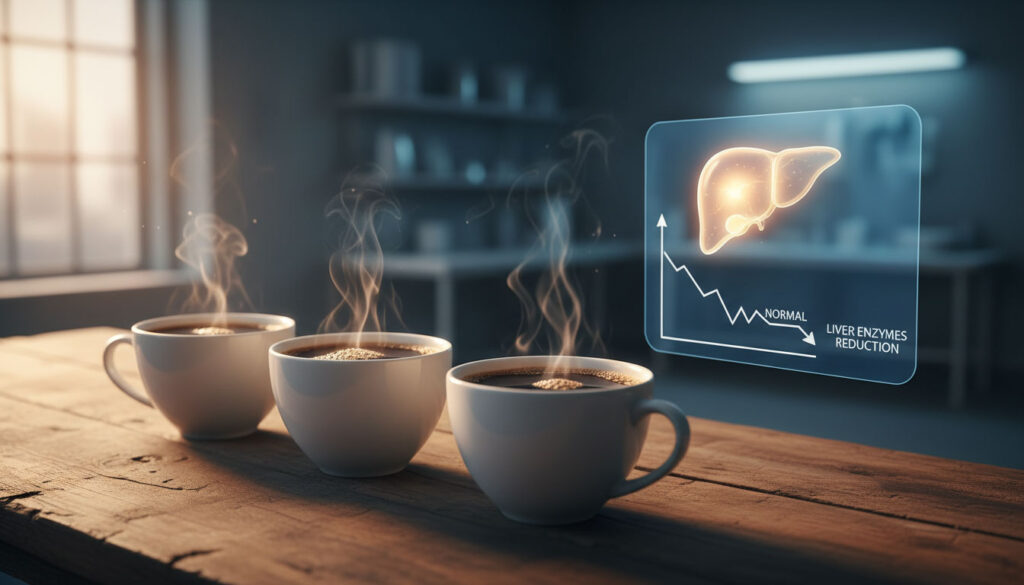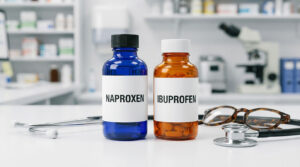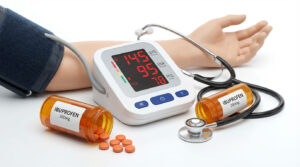Quick Answer: The Liver-Protecting Power of Coffee
Research from the National Institutes of Health (NIH) and extensive NHANES data confirms that drinking 3 cups of coffee a day significantly benefits liver health. This specific dosage helps lower abnormal liver enzymes (ALT, AST, and GGTP) and reduces the risk of fibrosis. The protective effect is driven by chlorogenic acid and potent coffee antioxidants that reduce inflammation and oxidative stress. Both regular and decaf options are effective, making coffee a vital tool for NAFLD risk reduction.
Table of Contents
You are sitting in the sterile environment of a doctor’s office, the paper on the exam table crinkling beneath you, waiting for the results of your annual physical. The doctor walks in, looks at a chart, and mentions “elevated liver enzymes.” They might throw around terms like “fatty liver,” “metabolic stress,” or “hepatic inflammation.” For millions of Americans every year, this is a moment of profound anxiety.
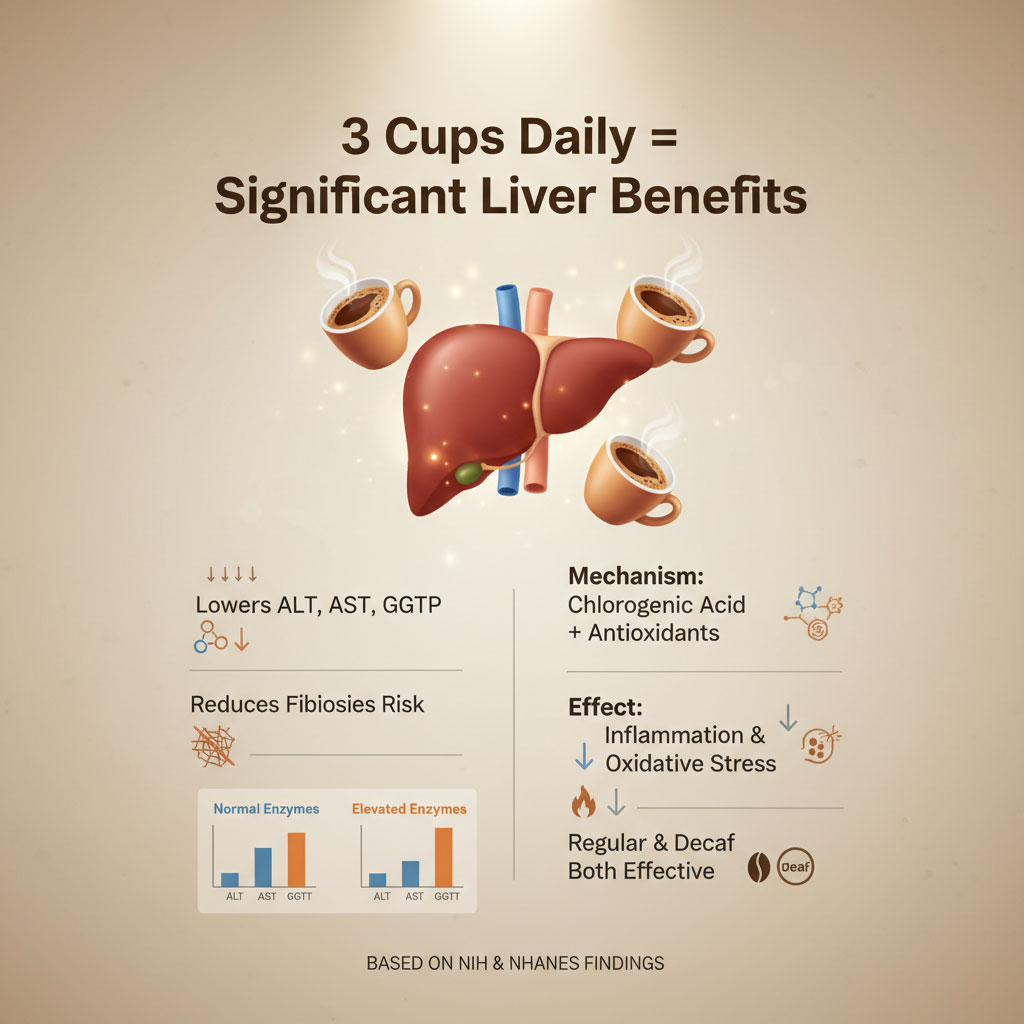
It often feels like an accusation or a sign of impending health decline. We naturally assume the prescription will involve draconian diets, expensive medications with long lists of side effects, or difficult lifestyle overhauls that feel impossible to maintain. While nutrition and movement remain the cornerstones of health, there is a powerful medicine likely sitting in your kitchen cabinet right now.
It is your morning coffee.
For decades, public health messaging told us to cut back on caffeine. We were told it was a vice, a diuretic, or a cause of hypertension. However, modern hepatology, the branch of medicine dedicated to the liver, has completely flipped the script. Extensive clinical research now suggests that coffee liver health benefits are not just folklore or wishful thinking. They are measurable, significant, and replicated across massive population studies. Drinking the right amount of coffee can act as a biological shield for your liver, protecting it from the ravages of the modern diet.
This article dives deep into the science of how coffee reduces liver enzymes. We will explore why 3 cups of coffee appears to be the magic number for therapeutic effect. We will also settle the ongoing debate on decaf vs regular coffee and explain why the roast level matters more than you think. We will look at the biochemistry of the bean, the mechanics of your metabolism, and how to craft the perfect cup for your liver.
Understanding the Liver Enzyme Dashboard
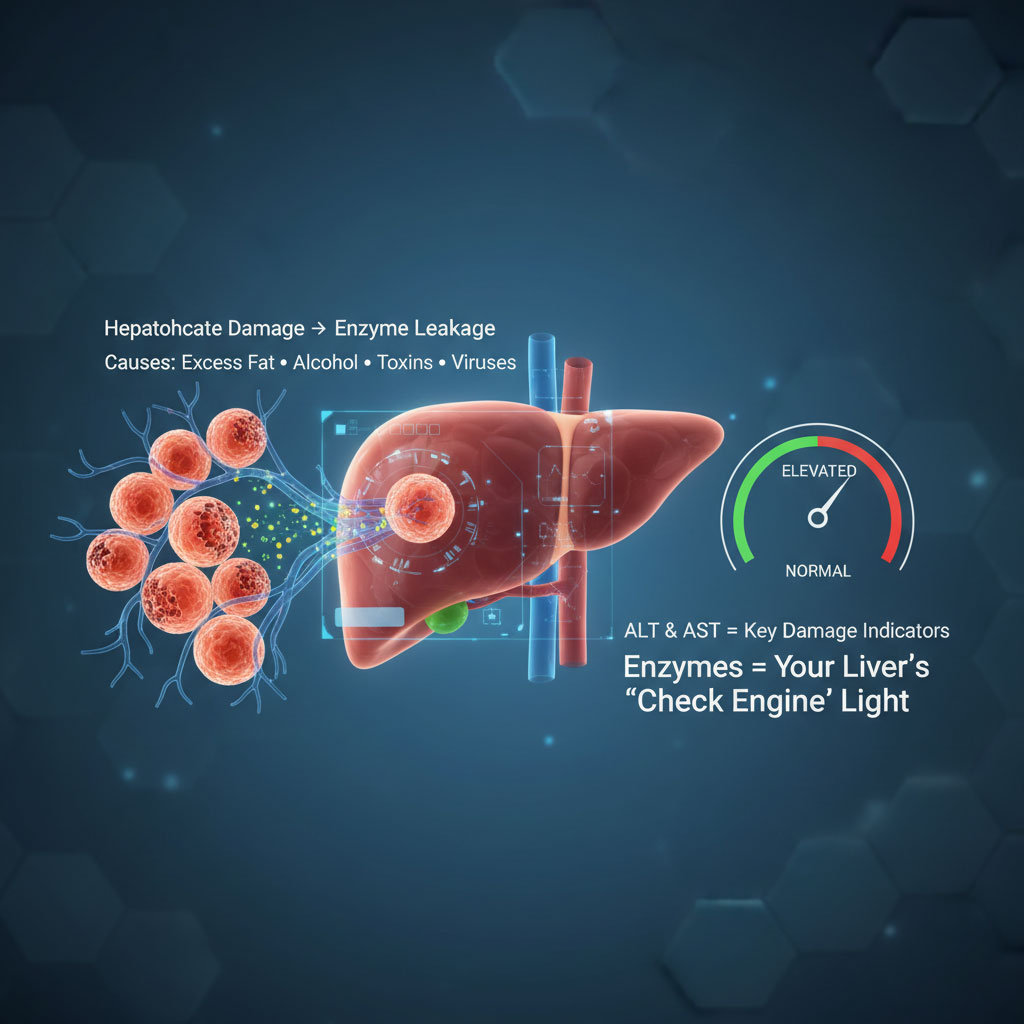
Before we can appreciate the cure, we must deeply understand the problem. Your liver is a resilient, hard-working organ, acting as the body’s primary filtration system. It processes everything you eat, drink, and breathe. When liver cells, known as hepatocytes, are damaged by excess fat, alcohol, toxins, or viruses, they become inflamed. As these cells swell, sustain damage, or die, their cellular membranes become permeable. They leak specific enzymes into your bloodstream that should normally remain inside the liver cells.
Doctors measure these liver enzymes (ALT, AST) to gauge the extent of this damage. You can think of these enzymes like the “check engine” light on your car dashboard. When the light comes on, it does not tell you exactly which part is broken, but it tells you that the engine is overheating and needs immediate attention.
What Are ALT, AST, and GGTP?
To understand your blood work, you need to understand the specific markers. The three primary players you will see on a comprehensive metabolic panel are:
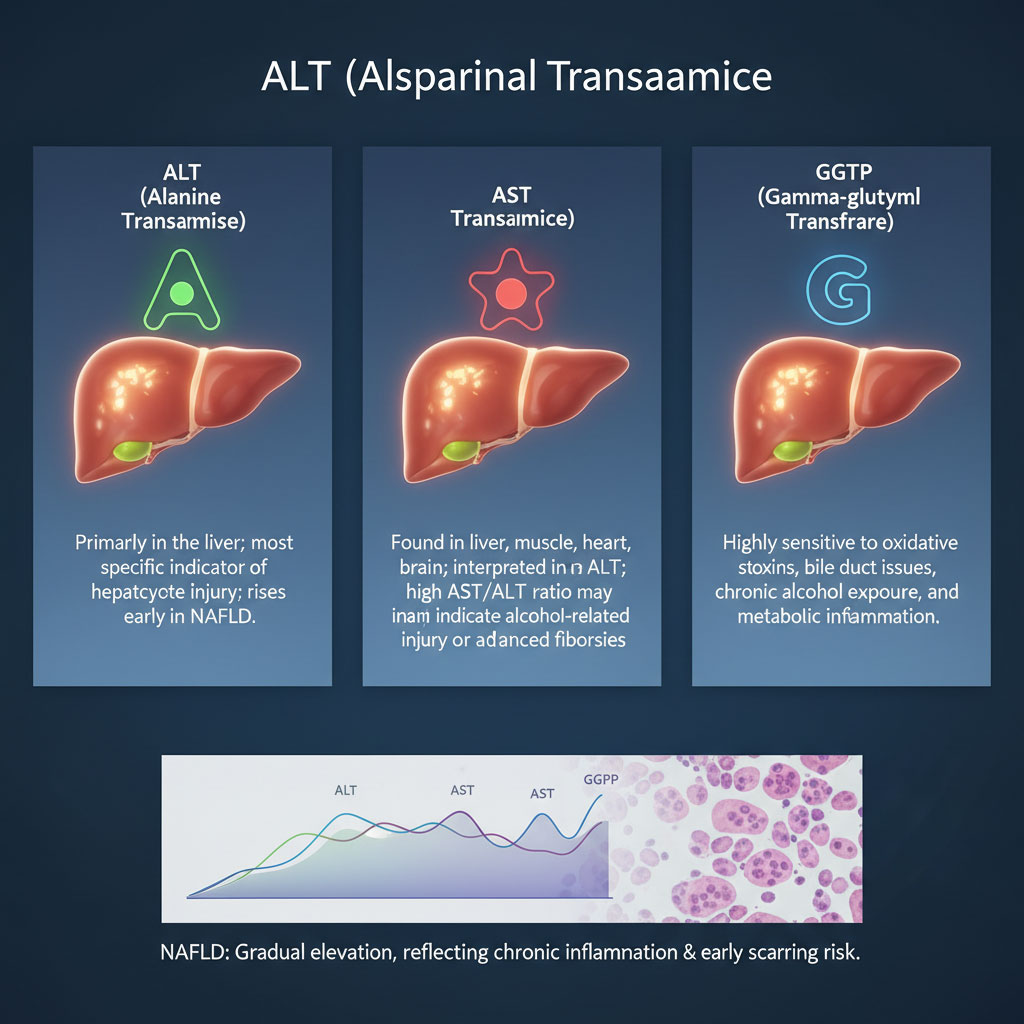
- Alanine Transaminase (ALT): This enzyme is found almost exclusively in the liver. Because of this specificity, high levels of ALT are the most direct indicator of liver injury. When hepatocytes are damaged, ALT floods the bloodstream. It is often the first number a doctor looks at to diagnose Non-Alcoholic Fatty Liver Disease (NAFLD).
- Aspartate Transaminase (AST): This enzyme is found in the liver, but it also resides in muscles, the heart, and the brain. While elevated AST indicates liver stress, it must be looked at in relation to ALT. A high AST to ALT ratio can sometimes indicate alcohol-related issues or, in more severe cases, advanced fibrosis or cirrhosis.
- Gamma-glutamyl Transferase (GGTP): This enzyme is highly sensitive to oxidative stress and toxin exposure. It is often elevated in cases of bile duct issues or chronic alcohol consumption, but it is also a sensitive marker for metabolic inflammation.
When you have Non-Alcoholic Fatty Liver Disease (NAFLD), which now affects roughly 25% of the American population, these numbers creep up slowly over time. This elevation signals that your liver is under constant attack from inflammation. If left unchecked, this inflammation triggers a wound-healing response that leads to scarring. This is where coffee liver enzymes management becomes critical as a preventative strategy.
The Silent Epidemic: Fatty Liver and Oxidative Stress
The root cause of most modern liver issues is a condition known as oxidative stress. This occurs when there is a dangerous imbalance between free radicals, which are unstable atoms that damage cells, and the antioxidants in your body that neutralize them. In a state of insulin resistance, which is common in modern lifestyles, the body struggles to process glucose effectively. Consequently, the liver begins to store excess energy as fat through a process called De Novo Lipogenesis.
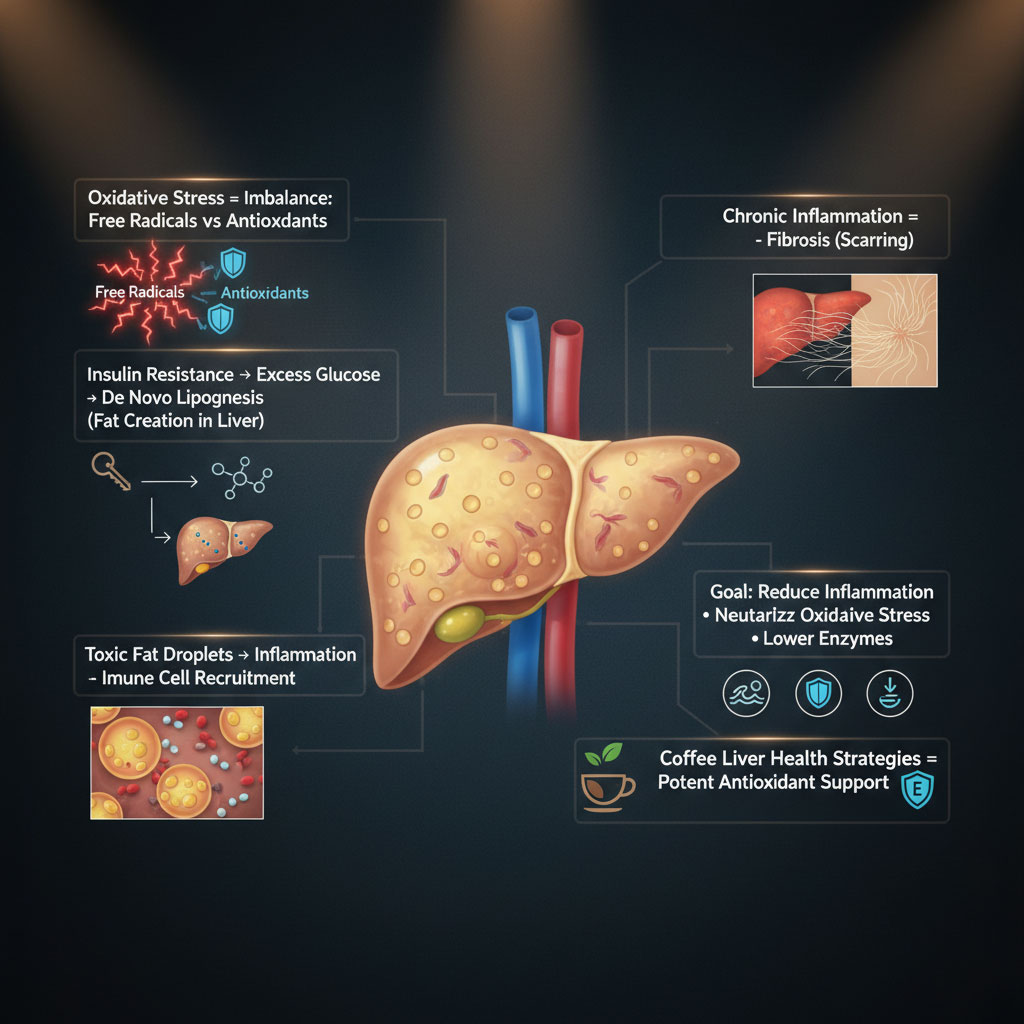
This fat buildup is not inert storage. The fat droplets within the liver cells can become toxic. They trigger inflammation and release signaling molecules that recruit immune cells to attack the liver tissue. This chronic, smoldering inflammation leads to scarring, clinically known as fibrosis. The goal of any liver therapy is to stop this inflammation, neutralize the oxidative stress, and lower the enzyme count. This is exactly where coffee liver health strategies shine, acting as a potent antioxidant intervention.
The Science: How Coffee Lowers Liver Enzymes
How does a simple bean accomplish what many pharmaceuticals cannot? How does coffee reduce liver enzymes at a cellular level? The answer lies in its chemical complexity. Coffee is far more than just a caffeine delivery vehicle. It is a complex botanical soup containing over 1,000 bioactive compounds, including vitamins, minerals, polyphenols, and alkaloids.
The Power of Polyphenols: Chlorogenic Acid
The superstar compound in coffee regarding liver health is chlorogenic acid. This is a polyphenol that acts as a potent antioxidant. It is found in higher concentrations in coffee than in almost any other dietary source. When you drink coffee, chlorogenic acid enters the bloodstream and eventually reaches the liver tissue.
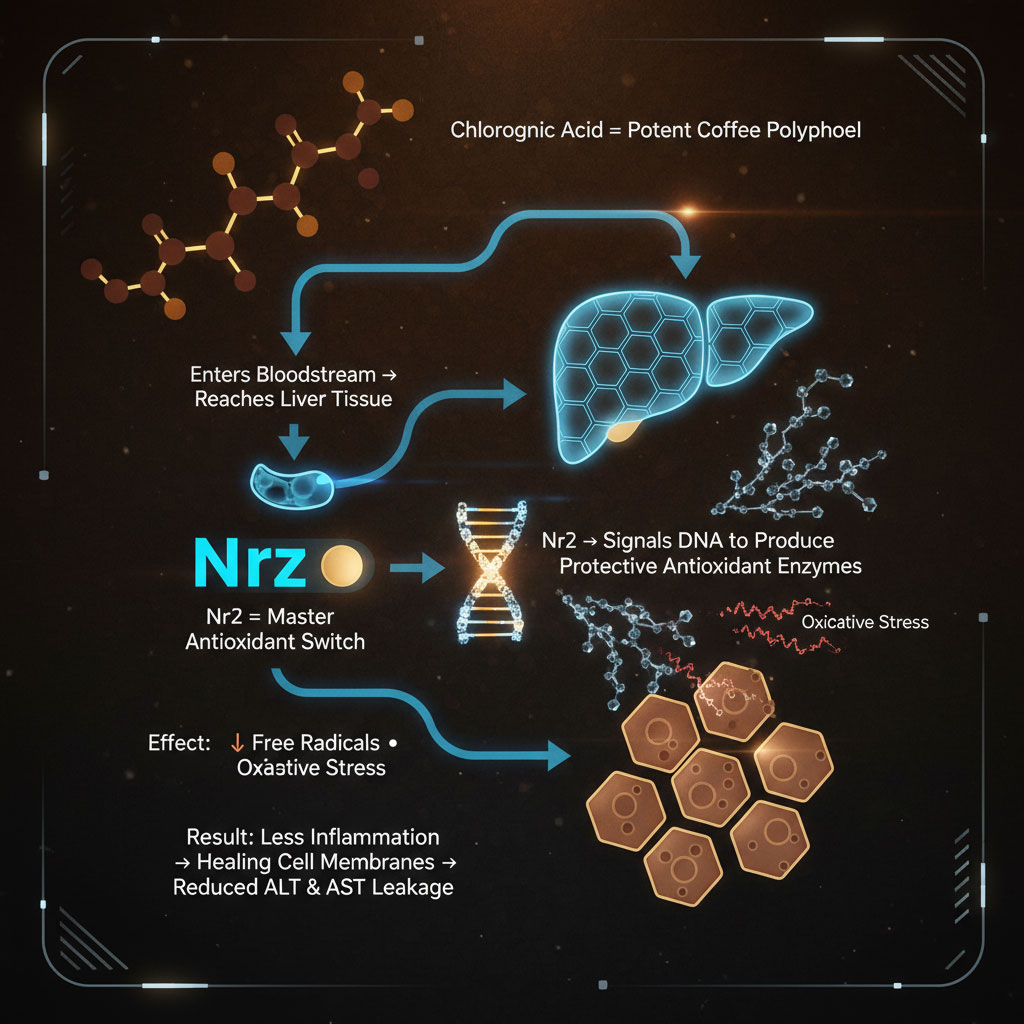
Once there, it performs a fascinating biological feat. It activates a specific biological pathway known as Nrf2 (Nuclear factor erythroid 2-related factor 2). You can think of Nrf2 as the master thermostat for your body’s antioxidant defense system. When activated by the compounds in coffee, Nrf2 signals your DNA to produce its own protective antioxidant enzymes. This process effectively flushes out free radicals and drastically reduces oxidative stress. By lowering the oxidative burden, the inflammation in the liver cells subsides. Consequently, the cellular membranes heal, and the leaking of liver enzymes (ALT, AST) slows down or stops.
Coffee Diterpenes: Kahweol and Cafestol
Two other critical compounds found in the oils of the coffee bean are kahweol and cafestol. These are diterpenes, a class of chemical compounds known for their anti-inflammatory and antimicrobial activity. Research indicates that these compounds help the liver produce natural detoxifying enzymes, such as glutathione S-transferase.
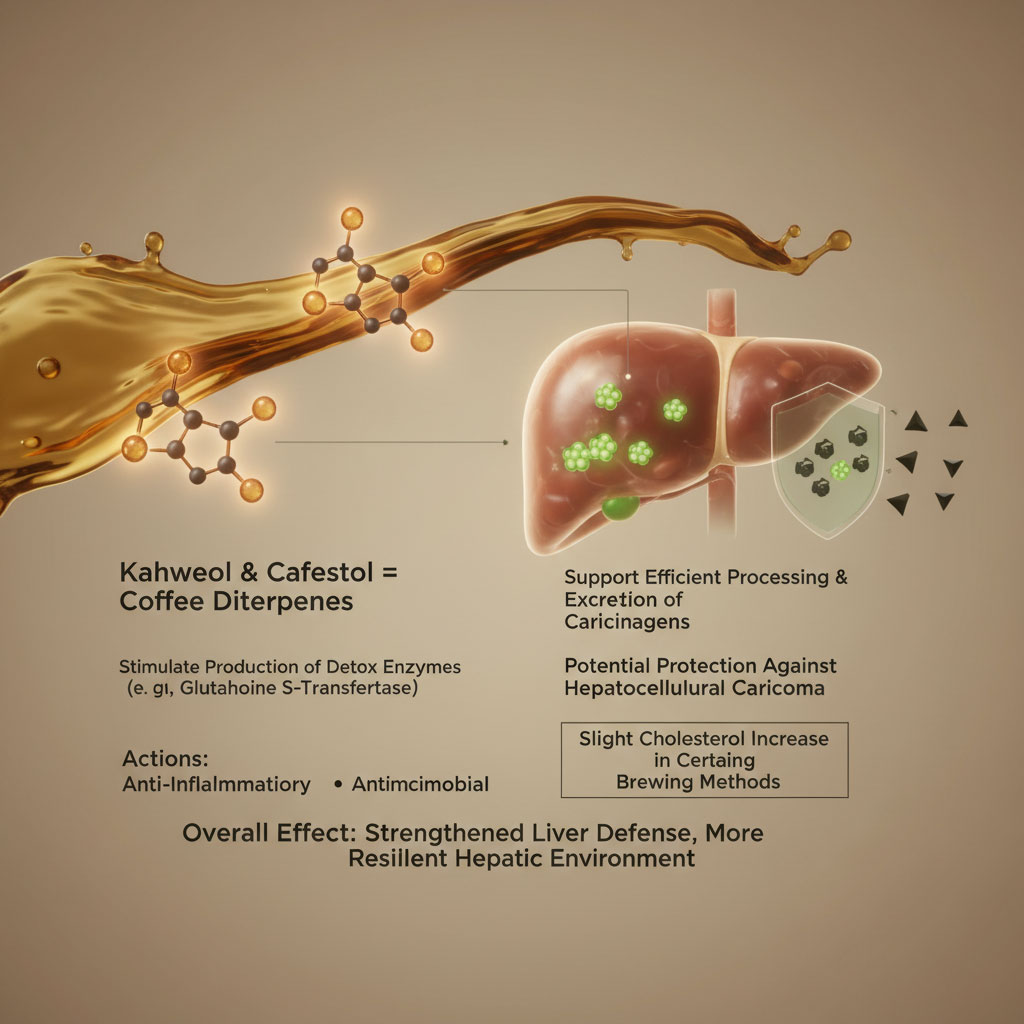
These diterpenes may also offer protection against hepatocellular carcinoma (liver cancer). They appear to help the liver process and excrete carcinogens more efficiently. While they can slightly raise cholesterol levels in certain brewing methods, their role in coffee liver health is undeniable. They effectively armor the liver cells against toxic insults, creating a more resilient hepatic environment.
Preventing Fibrosis: Inhibiting Hepatic Stellate Cells
The most dangerous aspect of fatty liver disease is not the fat itself, but the fibrosis that follows. Fibrosis is the medical term for the formation of scar tissue. The cells responsible for this scarring are called hepatic stellate cells.
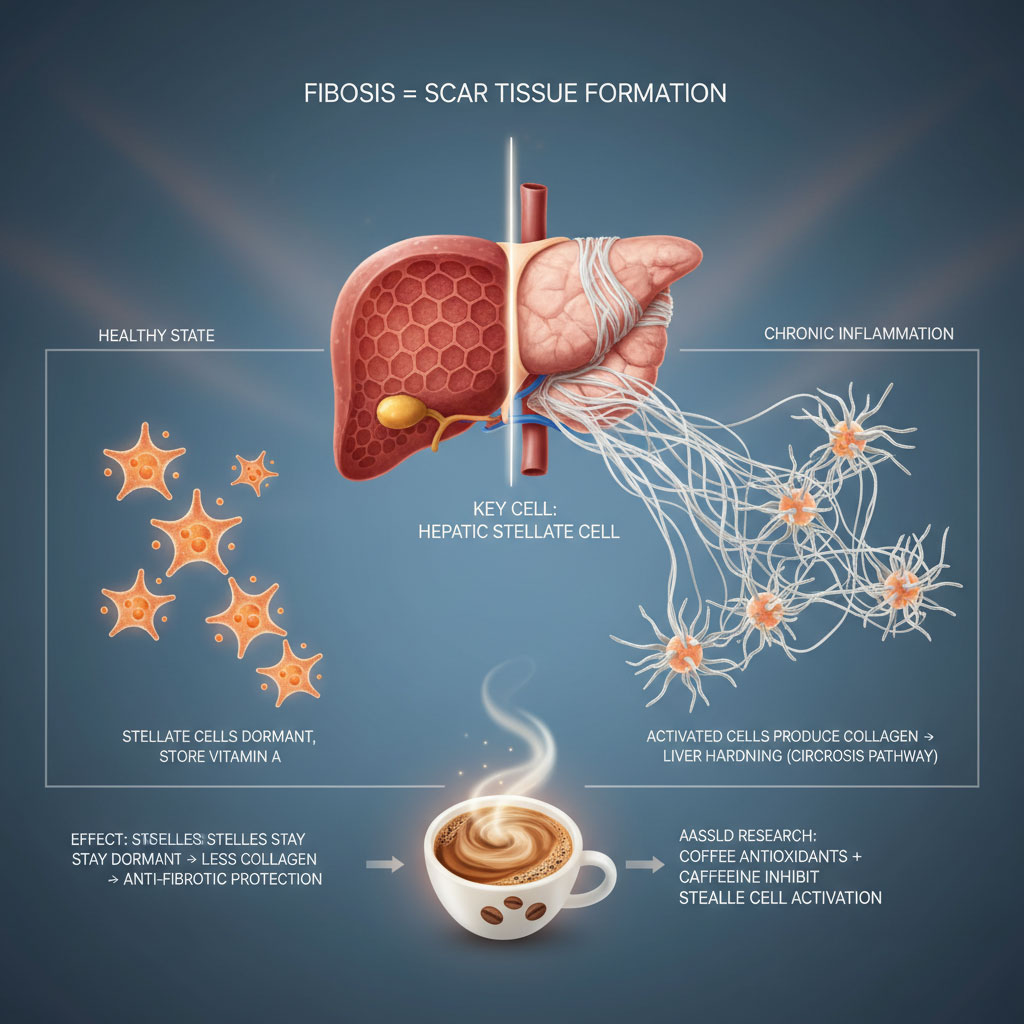
In a healthy liver, these stellate cells are dormant, storing Vitamin A and minding their own business. However, during periods of chronic inflammation and injury, they “wake up” and transform into myofibroblasts. These activated cells start laying down collagen, which is essentially scar tissue. This is the path to cirrhosis, where the soft, functioning liver tissue becomes hard and nodular.
Current research from the American Association for the Study of Liver Disease (AASLD) highlights a remarkable finding. Coffee antioxidants and caffeine appear to inhibit the activation of these stellate cells. By keeping these cells dormant and preventing them from laying down collagen, coffee for fatty liver disease acts as a powerful anti-fibrotic agent. It helps prevent the liver from stiffening, preserving its function even in the presence of metabolic stress.
The Dosage Protocol: Why “3 Cups” is the Magic Number
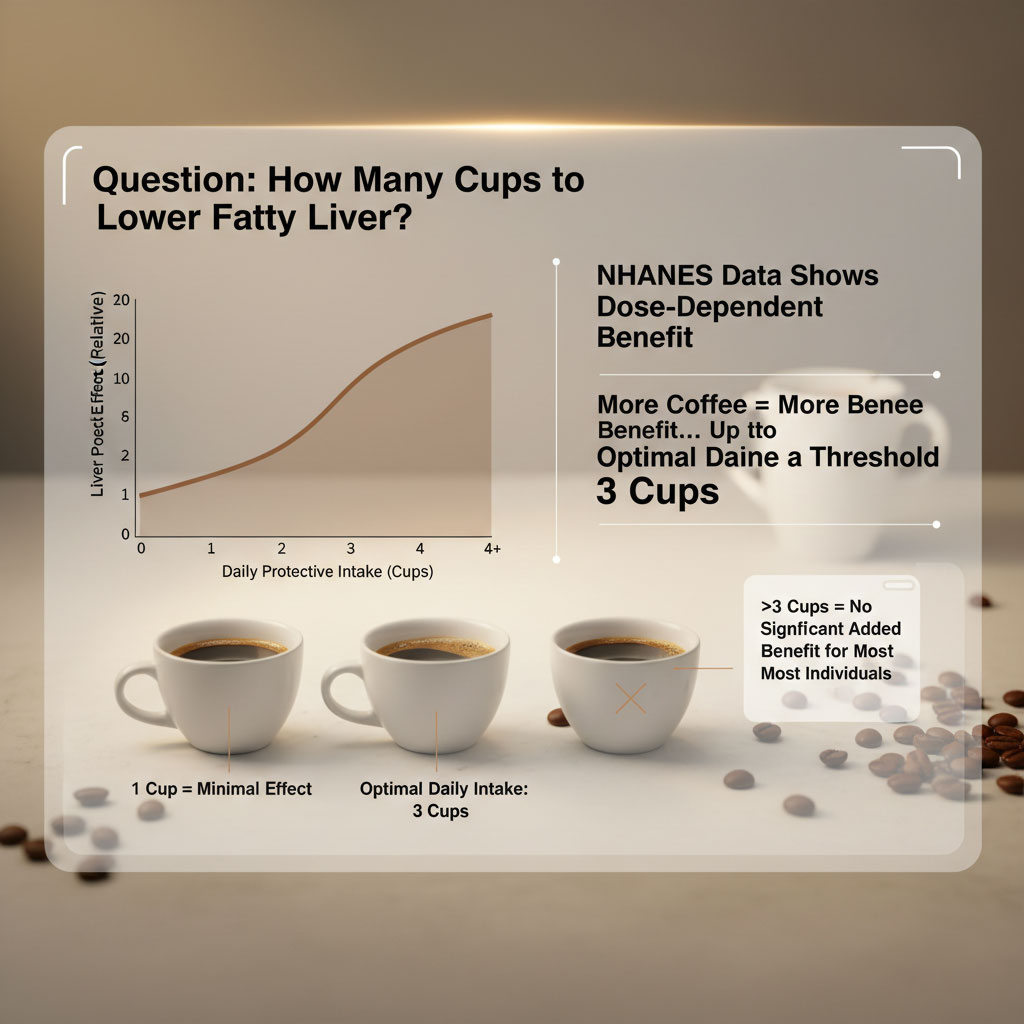
One of the most common questions patients ask their hepatologists is: How many cups of coffee to lower fatty liver? Is one cup enough to make a difference? Is five cups dangerous? The answer lies in the data.
Epidemiological data, including massive datasets from the NHANES data (National Health and Nutrition Examination Survey), reveals a dose-dependent relationship. This means the benefits generally increase with the amount consumed, up to a specific threshold.
Analyzing the Dose-Response Relationship
The data generally shows a “J-curve” or a linear benefit that eventually plateaus. Let us break down what the studies tell us about quantity:
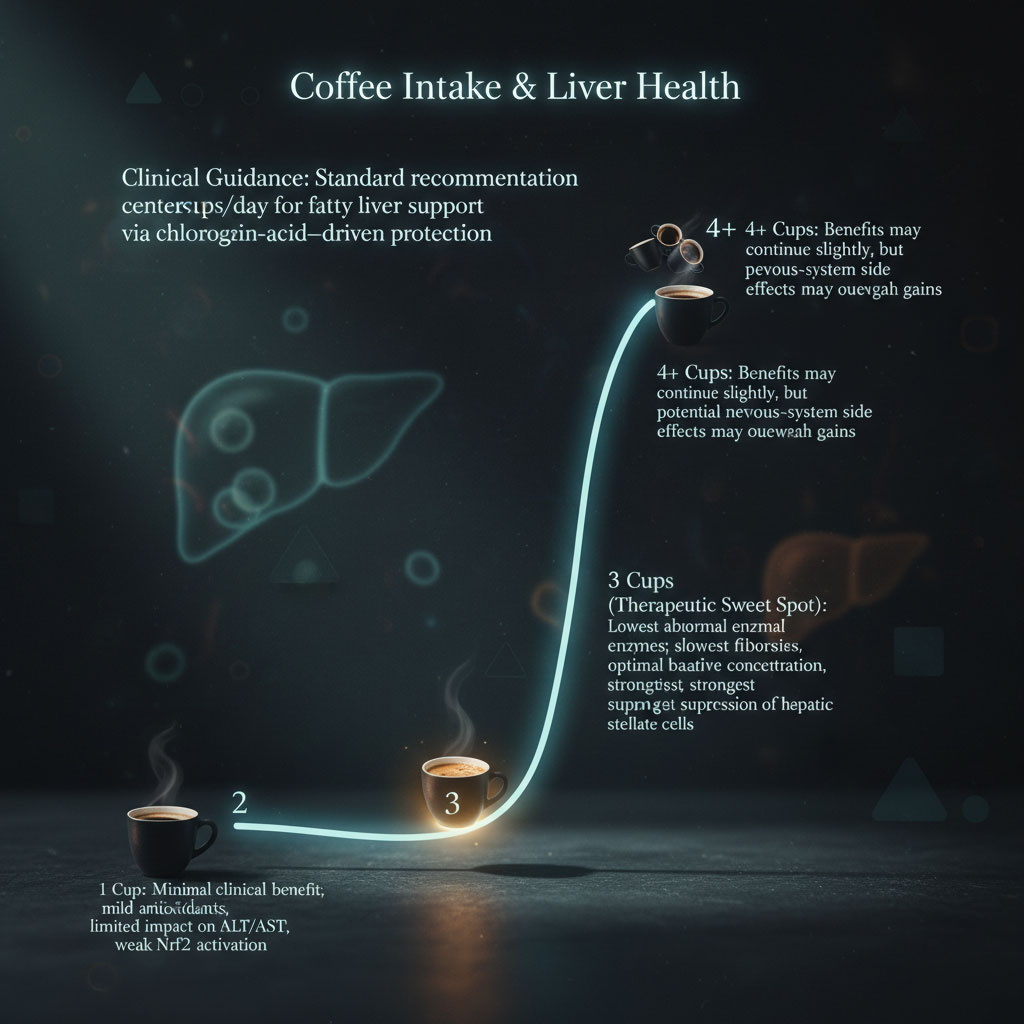
- 1 Cup: Shows minimal clinical benefit for the liver. While it provides some antioxidants, it is rarely enough to move the needle on liver enzymes (ALT, AST) significantly or to trigger the Nrf2 pathway robustly.
- 2 Cups: Begins to show a statistically significant reduction in the risk for fibrosis and enzyme elevation. Patients drinking two cups fare better than non-drinkers.
- 3 Cups of Coffee: This appears to be the therapeutic sweet spot. Studies consistently show that patients who consume 3 cups of coffee daily have the lowest levels of abnormal enzymes and the slowest progression of fibrosis. This dosage seems to provide the optimal concentration of bioactives to suppress hepatic stellate cells.
- 4+ Cups: The benefits for the liver continue and may even increase slightly, but the side effects regarding the nervous system (anxiety, insomnia, palpitations, digestive distress) may begin to outweigh the coffee liver health gains for many individuals.
Therefore, the standard clinical recommendation for coffee for fatty liver disease typically centers on 3 cups of coffee per day. This provides a high enough concentration of chlorogenic acid to trigger the protective mechanisms without overwhelming the adrenal system.
Can You Drink Too Much?
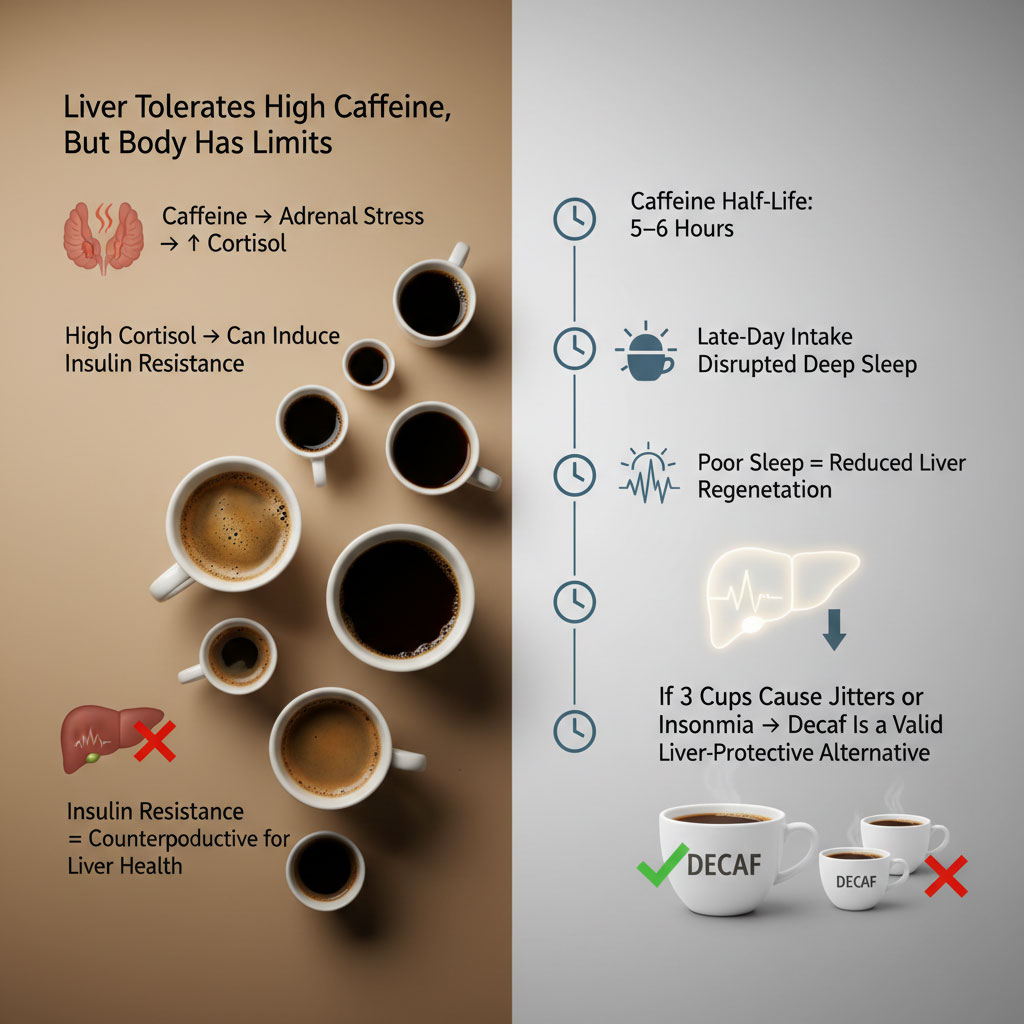
While the liver is remarkably tolerant of high caffeine intake, the rest of the body has limits. Excessive caffeine can stress the adrenal glands, leading to elevated cortisol levels. High cortisol can actually induce insulin resistance, which is counterproductive for liver health. Furthermore, caffeine has a half-life of roughly 5 to 6 hours. Drinking heavy amounts late in the day disrupts deep sleep. Since the liver does much of its regenerative work during sleep, chronic insomnia can negate the benefits of the coffee.
If you find that 3 cups of coffee makes you jittery or disrupts your sleep, you do not have to give up on the strategy. We will discuss why decaf is a perfectly valid, liver-protecting option in the next section.
The Great Debate: Decaf vs. Regular vs. Roast Level
A pervasive myth in the health community is that caffeine is the only active ingredient doing the work. This leads many people to believe that decaf is useless for liver enzymes (ALT, AST). Fortunately, the science says otherwise, which is excellent news for those sensitive to stimulants.
Does Decaf Coffee Benefit Liver Health?
The answer is a resounding yes.
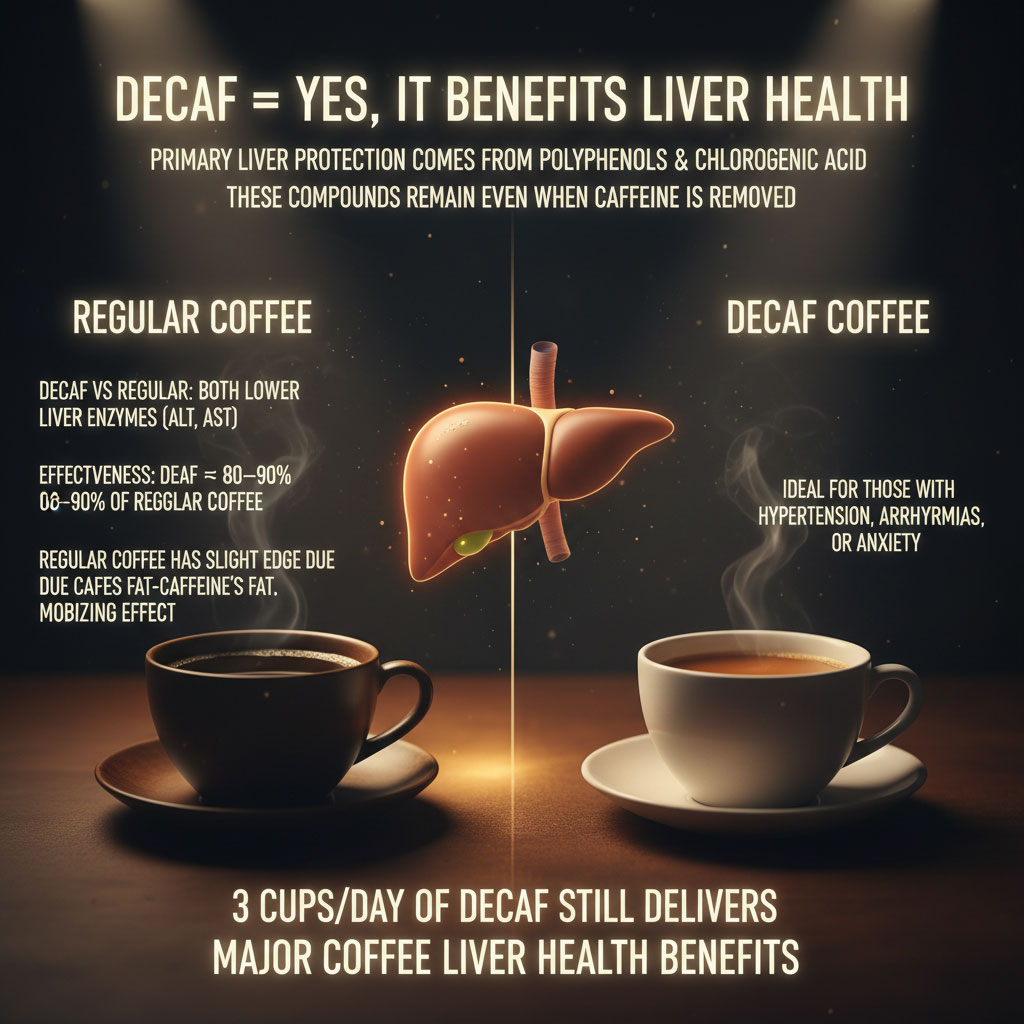
While caffeine does help metabolize fat and boost the metabolic rate, the primary anti-inflammatory work is done by the polyphenols and chlorogenic acid. These compounds are inherent to the coffee bean itself, regardless of whether the caffeine has been extracted.
Studies comparing decaf vs regular coffee show that decaf drinkers also experience a significant drop in liver enzymes. While regular coffee might have a slight edge due to caffeine’s ability to mobilize fat, decaf is roughly 80% to 90% as effective. This is fantastic news for people with high blood pressure, heart arrhythmias, or severe anxiety. You can drink 3 cups of coffee (decaf) and still reap the vast majority of the coffee liver health rewards.
The Roast Spectrum: Light vs. Dark
Coffee enthusiasts often debate the flavor profile of roasts, discussing fruit notes versus chocolate notes. However, health enthusiasts should look at the chemistry of roasting. The roasting process involves subjecting the green coffee beans to high heat. This heat catalyzes chemical reactions, but it also breaks down some of the delicate antioxidants.
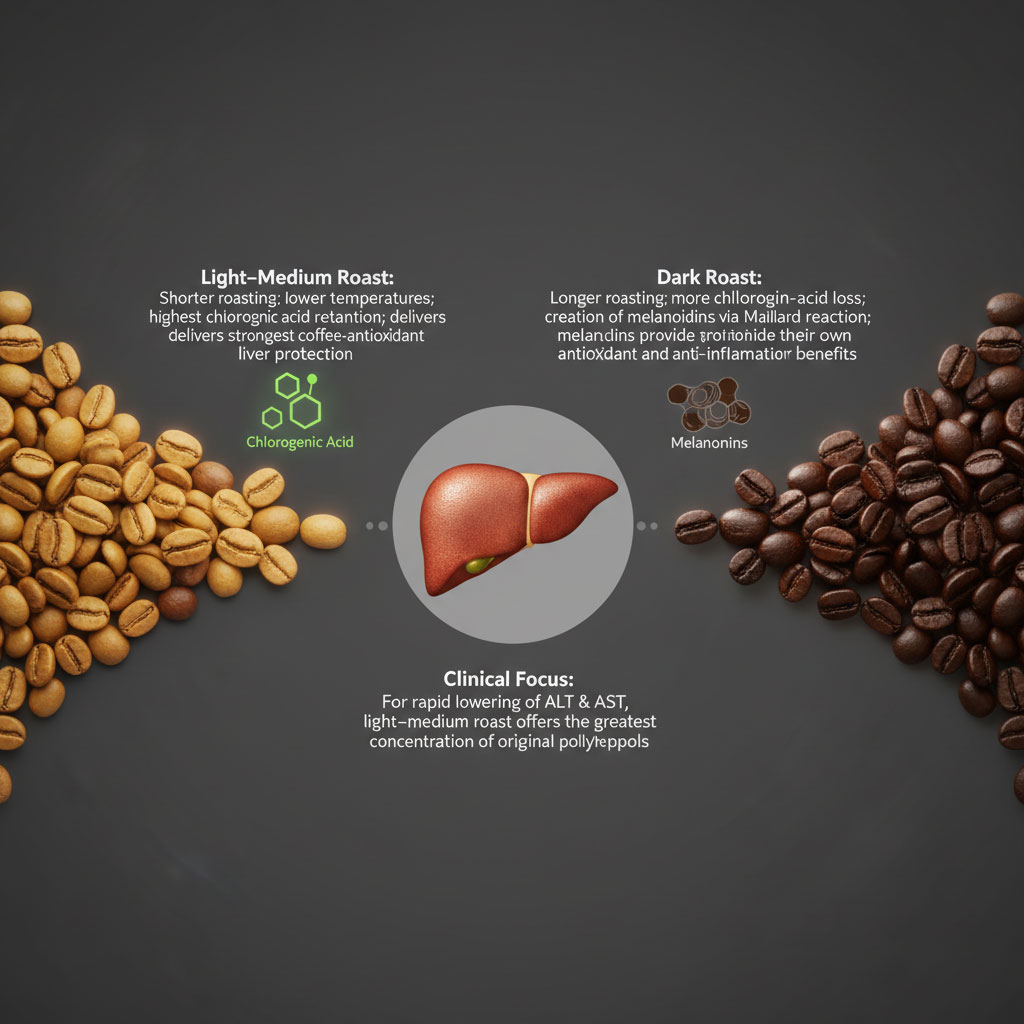
- Light to Medium Roast: These beans are roasted for a shorter duration and at lower temperatures. They retain the highest levels of chlorogenic acid. If your primary goal is coffee antioxidants liver protection, a light or medium roast is theoretically superior because it delivers a higher dose of the anti-inflammatory compounds.
- Dark Roast: Prolonged roasting destroys a significant portion of the chlorogenic acid. However, the roasting process creates other compounds called melanoidins. These are brown polymers formed during the Maillard reaction. Melanoidins have their own antioxidant and anti-inflammatory properties.
For the specific purpose of lowering liver enzymes (ALT, AST) rapidly, a light to medium roast is generally recommended to maximize the intake of the original polyphenols found in the green bean.
Comparison Table: Decaf vs. Regular for Liver Health
The following table breaks down the biological differences to help you choose the right brew for your specific health profile.
| Feature | Regular Coffee | Decaf Coffee | Verdict for Liver Health |
| Caffeine Content | 95mg per cup (avg) | 2-5mg per cup (avg) | Regular helps fat metabolism slightly more due to thermogenesis. |
| Antioxidant Levels | High Chlorogenic Acid | High Chlorogenic Acid | Equal Benefit. Both effectively reduce oxidative stress. |
| Impact on Enzymes | Significantly lowers ALT/AST | Significantly lowers ALT/AST | Equal Benefit. Both are effective for normalizing enzymes. |
| Blood Pressure | May temporarily raise BP | No impact on BP | Decaf Wins for hypertensive patients. |
| Fibrosis Prevention | Strong anti-fibrotic effect | Moderate to Strong effect | Regular Wins slightly due to caffeine synergy with stellate cells. |
Preparation Matters: How to Brew for Maximum Health
You can take the world’s healthiest bean and ruin its medicinal value with the wrong preparation method. When using coffee for fatty liver disease, how you brew it and what you put in it matters immensely.
The Cholesterol Factor: Filtered vs. Unfiltered
This is a critical nuance often missed in general health advice. Coffee contains natural oils known as diterpenes (specifically cafestol and kahweol). While these have some anti-cancer properties, they are also potent cholesterol-raising agents. They suppress the body’s ability to regulate LDL cholesterol.
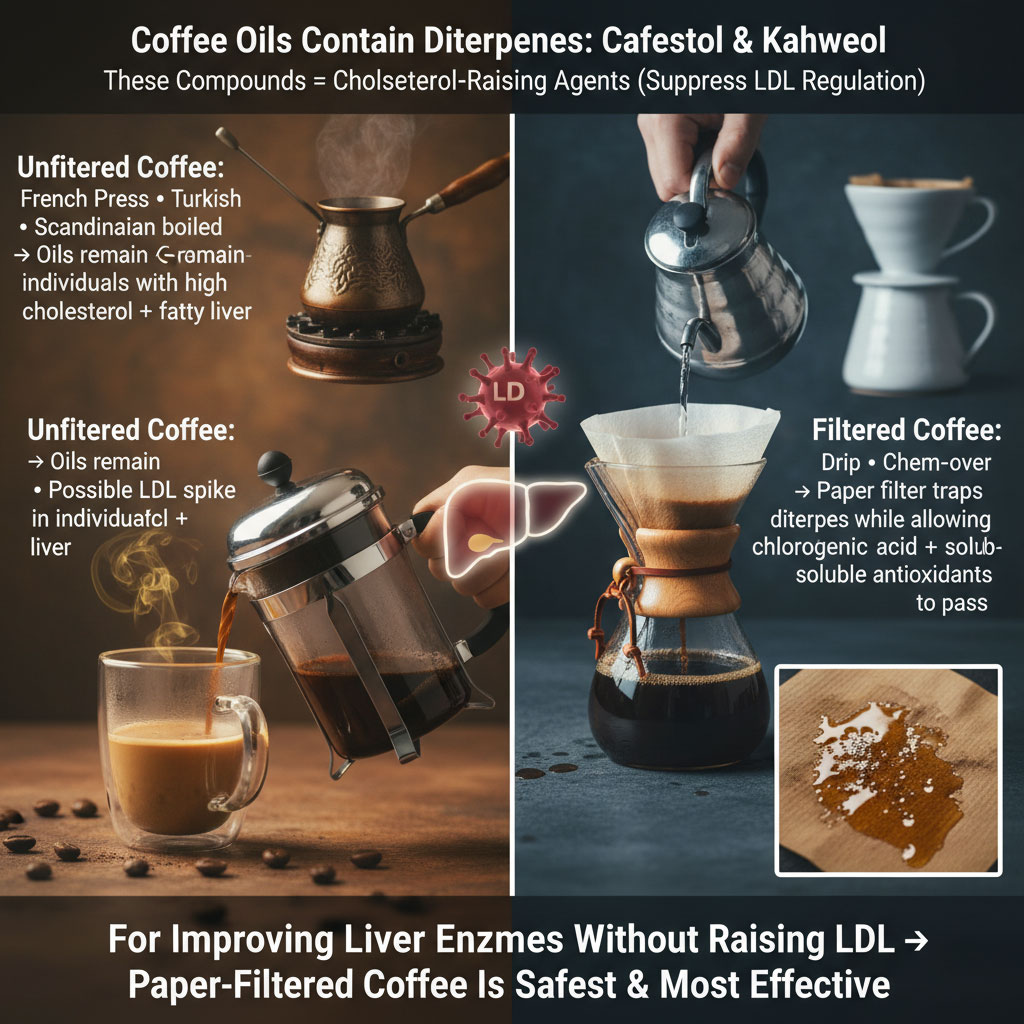
- Unfiltered Coffee: Methods like French Press, Turkish coffee, Scandinavian boiled coffee, or metal-filter espresso allow these oils to remain in the cup. If you have high cholesterol alongside fatty liver (which is common in metabolic syndrome), drinking 3 cups of coffee made this way could spike your LDL cholesterol significantly.
- Filtered Coffee: Standard drip coffee makers, Chemex, or pour-over methods use paper filters. These paper filters are dense enough to trap the oily diterpenes, but they let the chlorogenic acid and soluble antioxidants pass through into your cup.
For the majority of patients looking to improve coffee liver enzymes profiles without negatively impacting their cardiovascular health, paper-filtered coffee is the safest and most effective choice.
The Additive Trap: Black Coffee vs. Sugar Bombs
To get the black coffee benefits, you must avoid turning your medicine into a dessert. This is where many well-intentioned patients fail.
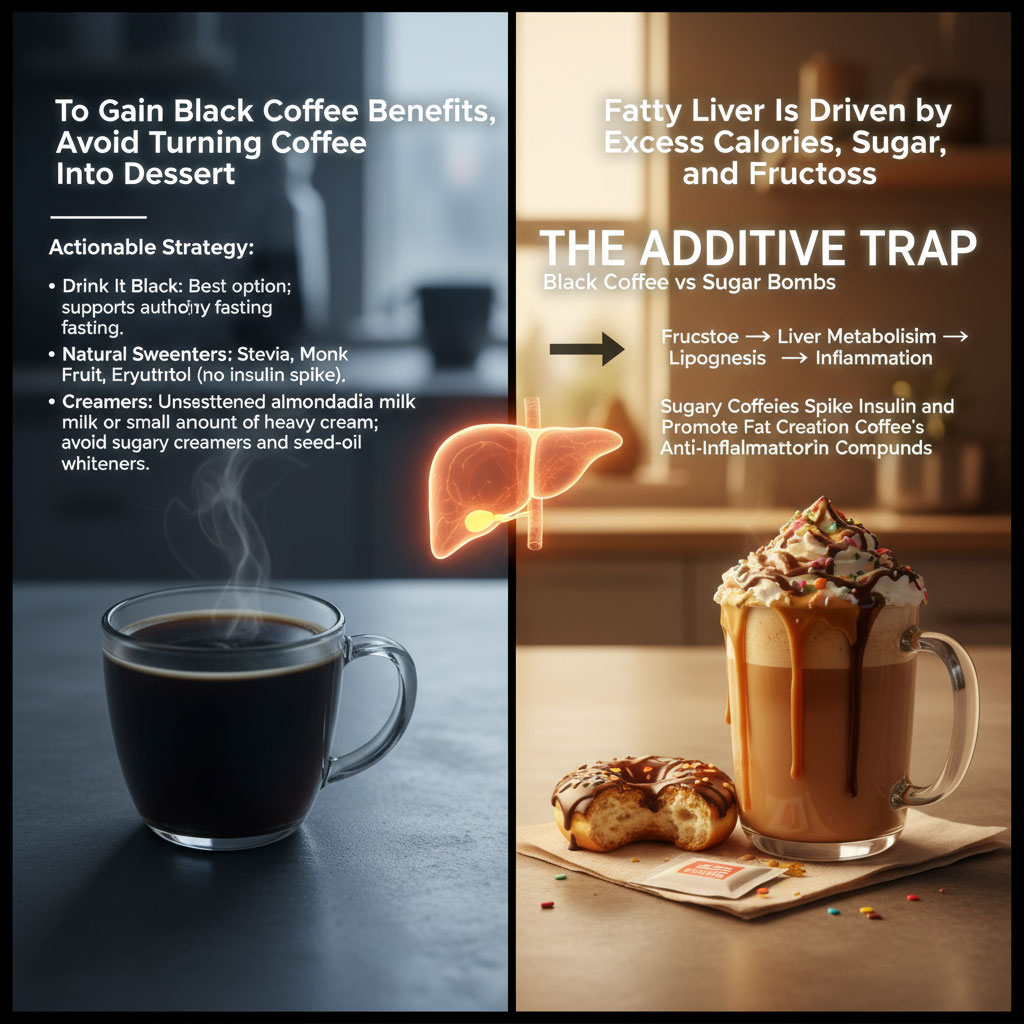
Fatty liver disease is driven by excess calories, specifically from sugar and fructose. Fructose is metabolized almost exclusively by the liver, much like alcohol. If you take your 3 cups of coffee with three spoons of sugar and a generous pour of hazelnut creamer, you are feeding the disease you are trying to fight.
The sugar triggers a rapid insulin release and promotes lipogenesis (fat creation) directly in the liver. This inflammation negates the anti-inflammatory effects of the coffee compounds.
Actionable Strategy for Transitioning:
- Drink it Black: This is the gold standard. It allows for “autophagy” (cellular cleanup) if drunk during a fasting window.
- Natural Sweeteners: If you need sweetness, use a natural, non-glycemic sweetener like Stevia, Monk Fruit, or Erythritol. These do not spike insulin.
- Creamers: If you need creaminess, use a splash of unsweetened almond milk, macadamia milk, or a small amount of heavy cream (if you are not calorie restricted). Avoid sugary chemical creamers and seed-oil based whiteners.
Comparative Analysis: Coffee vs. Other Liver Supplements
Walk into any health food store, and you will see shelves lined with “Liver Detox” supplements. How does a humble cup of joe stack up against expensive pills like Milk Thistle, N-Acetyl Cysteine (NAC), or Turmeric?
Coffee vs. Common Liver Supplements
| Remedy | Scientific Backing (1-10) | Primary Mechanism | Cost | Best For… |
| Coffee (3 Cups) | 9/10 (Strongest Data) | Antioxidant (Nrf2 pathway), Anti-fibrotic, Enzyme reduction | Low ($) | Overall Liver Health & NAFLD |
| Milk Thistle | 6/10 (Mixed Results) | Silymarin antioxidant protection | Medium ( | Acute toxicity, mushroom poisoning support |
| Turmeric (Curcumin) | 7/10 (Promising) | General Anti-inflammatory | Medium ( | Reducing systemic inflammation |
| Vitamin E | 8/10 (Clinical Use) | Reduces oxidative stress in non-diabetics | Low ($) | Biopsy-proven NASH (Must use with doctor supervision) |
As the table shows, coffee liver health interventions often possess stronger clinical backing than many herbal supplements. It is currently one of the few “foods” explicitly endorsed by liver specialists for NAFLD risk reduction. Unlike supplements, which can suffer from poor bioavailability or purity issues, coffee is a whole food matrix that is easily absorbed by the body.
Real-World Data & Case Studies
The recommendation to drink 3 cups of coffee is not based on small, isolated experiments in petri dishes. It is backed by massive population studies involving thousands of human participants over decades.
The NHANES Study Insights
The NHANES data is a major program of studies designed to assess the health and nutritional status of adults and children in the United States. Comprehensive analysis of this data has repeatedly shown that caffeine intake is independently associated with a lower risk of NAFLD.
Participants who reported drinking regular coffee had consistently lower liver enzymes (ALT, AST) compared to non-coffee drinkers. This correlation held true even after researchers adjusted for confounding factors like obesity, smoking, age, and alcohol use. This suggests that coffee offers a protective benefit regardless of other lifestyle factors.
The Rotterdam Study
Another landmark piece of research is the Rotterdam Study, a large population-based prospective cohort study in the Netherlands. Researchers found that frequent coffee consumption was associated with lower liver stiffness. Liver stiffness is a direct proxy for fibrosis; the stiffer the liver, the more scarred it is. This supports the idea of coffee liver fibrosis prevention.
The study highlighted that the beneficial effects were visible in both healthy individuals and those with existing liver pathology. This suggests coffee is both preventative (stopping the disease from starting) and therapeutic (slowing the progression of existing disease).
Reducing Risk of Liver Cancer
Perhaps the most profound finding in hepatology is the consistent link between coffee consumption and a reduction in Hepatocellular Carcinoma (HCC), the most common and deadly type of liver cancer. The American Cancer Society and various international cancer research bodies note that studies have found that drinking coffee lowers the risk of dying from liver cancer. The kahweol and cafestol diterpenes, along with polyphenols, are believed to help the liver flush out carcinogens and repair DNA damage before tumors can form.
Who Should Be Careful? (Contraindications)
While the benefits of coffee liver enzymes reduction are clear and compelling, coffee is not a universal remedy for everyone. The principles of personalized medicine dictate that we must consider safety and individual health contexts.
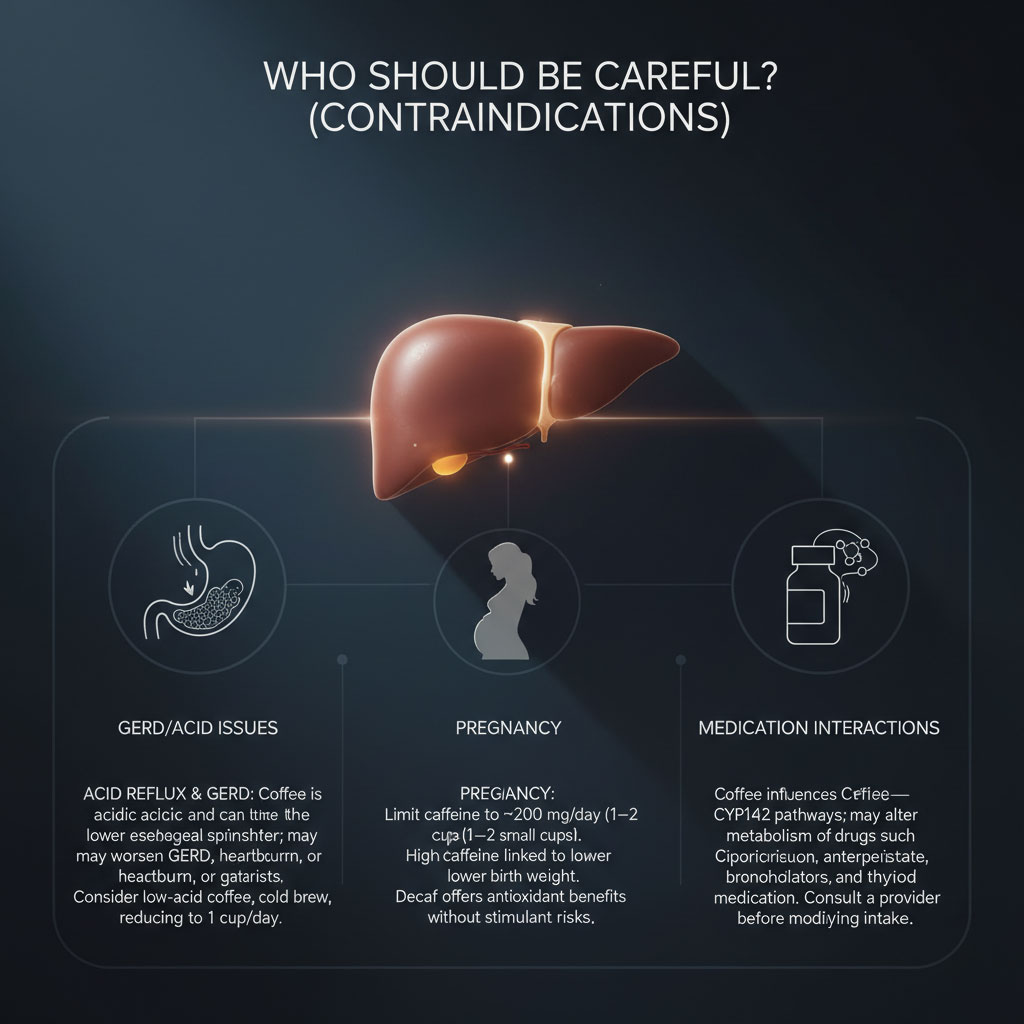
Managing Acid Reflux and GERD
Coffee is naturally acidic. It can also relax the lower esophageal sphincter, the valve that keeps stomach acid from rising into the throat. If you suffer from Gastroesophageal Reflux Disease (GERD), severe heartburn, or gastritis, drinking 3 cups of coffee might worsen your symptoms significantly. In this case, seeking out low-acid coffee options, cold brew (which is naturally lower in acid), or sticking to a single cup per day might be necessary.
Pregnancy and Caffeine Sensitivity
Pregnant women are generally advised by obstetricians to limit caffeine intake to 200mg per day (roughly 1 to 2 small cups). High caffeine intake has been linked to lower birth weights and other complications. If you are pregnant and concerned about liver enzymes (ALT, AST), it is crucial to consult your doctor. Decaf coffee remains a viable option in this scenario, offering the antioxidant benefits without the stimulant risks.
Interactions with Medications
Coffee acts on the same liver detoxification pathways (specifically the CYP1A2 enzyme) that metabolize many drugs. This means coffee can affect how quickly or slowly your body processes medication. It can interact with antibiotics (like Ciprofloxacin), antidepressants, bronchodilators, and thyroid medication. Always consult your healthcare provider before making significant changes to your caffeine habits if you are on prescription medication to avoid altered drug efficacy.
Integrating Coffee into a Liver-Healthy Lifestyle
While coffee is a potent tool, it works best when part of a broader strategy. Think of coffee as the “accelerator” for liver healing, while diet and lifestyle are the “engine.”
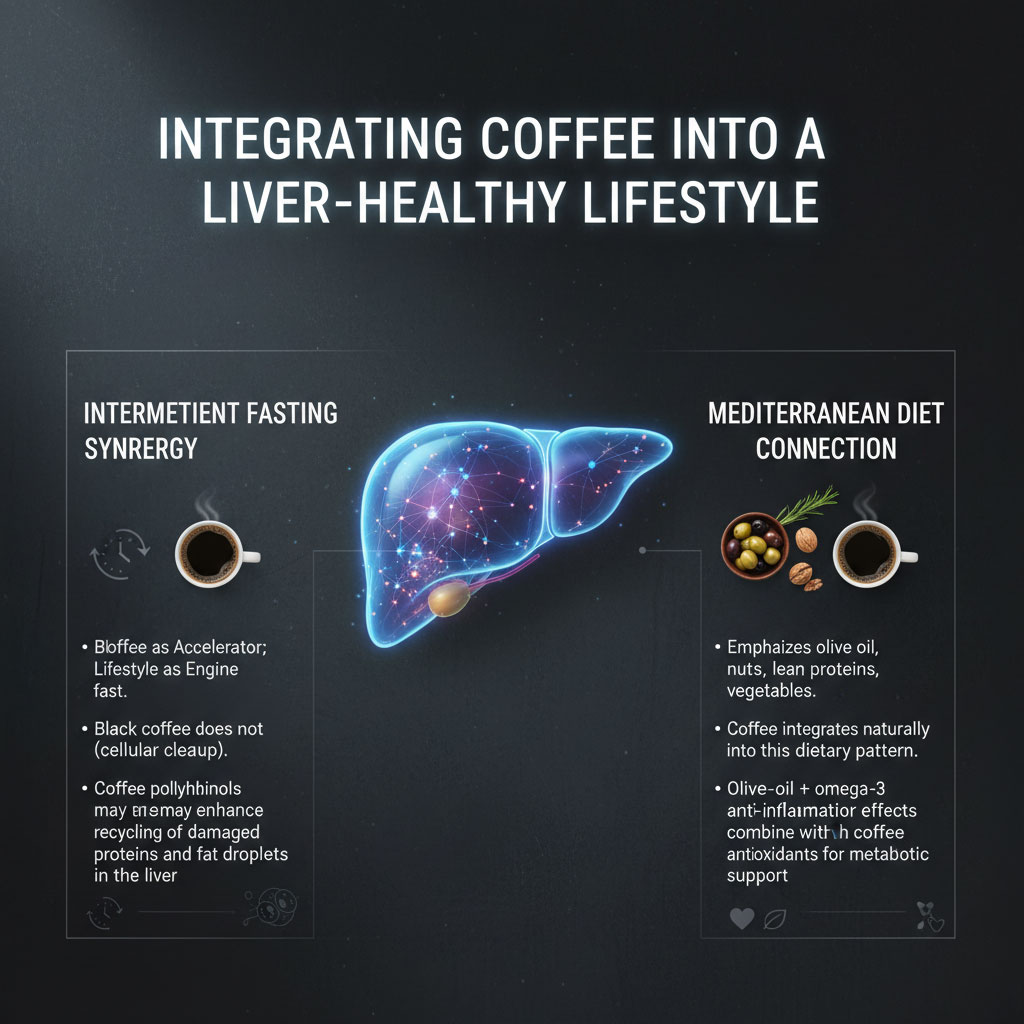
The Intermittent Fasting Synergy
Many liver patients practice intermittent fasting (eating only within an 8-hour window) to lower insulin levels and reduce liver fat. Black coffee is the perfect companion for fasting. Drinking black coffee during the fasting window does not break the fast; in fact, it may enhance autophagy. Autophagy is the body’s cellular cleanup process where it recycles damaged cells. The polyphenols in coffee can stimulate this process, potentially helping the liver clear out damaged proteins and fat droplets more efficiently.
The Mediterranean Connection
The most researched diet for fatty liver is the Mediterranean diet, which focuses on healthy fats (olive oil, nuts), lean proteins, and vegetables. Coffee fits perfectly into this dietary pattern. In many Mediterranean cultures, coffee consumption is a daily ritual. Combining the anti-inflammatory properties of olive oil and omega-3 fatty acids with the antioxidants in coffee creates a powerful synergistic effect that combats metabolic syndrome from multiple angles.
Your Daily Prescription
The evidence is overwhelming, consistent, and encouraging. For the millions of Americans facing liver health challenges, the solution might be brewing in the kitchen rather than waiting at the pharmacy. The stigma of liver disease often brings feelings of helplessness, but this research offers a tangible, enjoyable, and accessible way to take control of your health.
To recap the evidence-based strategy for coffee liver health:
- Aim for 3 Cups: This dosage provides the optimal statistical balance for lowering liver enzymes (ALT, AST) and preventing fibrosis.
- Watch the Roast: A light to medium roast preserves the most chlorogenic acid, maximizing the antioxidant punch.
- Keep it Pure: Avoid sugar, syrups, and heavy creams to prevent insulin spikes. Black coffee benefits are superior for metabolic health.
- Filter it: Use paper filters (drip, pour-over) to protect your cholesterol levels from coffee oils.
- Decaf Works: If you cannot handle caffeine, decaf is a scientifically proven alternative that still protects the liver.
Coffee is a powerful ally, but it is not a magic wand. It works best when combined with a balanced, low-sugar diet and regular physical activity. If you have elevated enzymes, talk to your doctor about explicitly adding coffee to your treatment plan as a therapeutic food.
Your liver works tirelessly for you every single second of the day, filtering toxins and managing energy. Treating it to a few cups of high-quality, antioxidant-rich coffee might be the best way to say thank you and ensure it keeps working for years to come.
Frequently Asked Questions (FAQs)
Can coffee reverse fatty liver completely?
While coffee alone cannot typically “cure” or reverse fatty liver disease in isolation, it significantly aids the reversal process. Drinking 3 cups of coffee daily helps lower liver enzymes (ALT, AST) and reduces inflammation. When this is combined with a weight loss of 5% to 10% of body weight and a low-sugar diet, the complete reversal of fatty liver is entirely possible and frequently observed in clinical practice.
Is instant coffee effective for liver enzymes?
Yes, instant coffee is effective. Although the processing of instant coffee may degrade some antioxidants compared to fresh brewed beans, studies show it still contains substantial levels of chlorogenic acid and caffeine. It provides coffee liver health benefits and is associated with lower risk in population studies. It is a convenient, budget-friendly option that still counts toward your daily protective intake.
Does cold brew have the same benefits?
Cold brew coffee is distinct because it is steeped in cold water for a long duration. This makes it less acidic and easier on the stomach. While the chemical profile differs slightly—often containing less acid but similar caffeine—it still retains the necessary polyphenols. It is considered beneficial for NAFLD risk reduction, making it a great option for those with acid reflux.
What is the best time to drink coffee for liver health?
The timing matters less for the liver itself and more for your circadian rhythm and cortisol regulation. To avoid disrupting sleep (which hurts liver health by preventing regeneration), it is best to finish your last cup by 2:00 PM. Consuming your 3 cups of coffee in the morning and early afternoon ensures you get the antioxidant protection without the side effect of insomnia.
Does adding milk reduce the antioxidant absorption?
Some studies suggest that the casein proteins found in dairy milk can bind to polyphenols like chlorogenic acid, potentially reducing their absorption in the gut slightly. However, the effect is not significant enough to negate the benefits entirely. If you need milk, plant-based options like almond, macadamia, or oat milk have less protein interaction and may preserve more antioxidant bioavailability.
How long does it take to see results in enzyme levels?
This varies by individual metabolism and the severity of the inflammation. However, many patients see measurable improvements in their liver enzymes (ALT, AST) within 4 to 6 weeks of consistent coffee consumption, provided they are not simultaneously increasing sugar or alcohol intake. Regular blood work is the best way to track this progress.
Is tea as good as coffee for the liver?
Green tea is excellent for the liver due to a compound called EGCG (Epigallocatechin gallate). However, when comparing head-to-head for lowering enzymes and preventing fibrosis in NAFLD patients, coffee liver health studies generally show coffee to be more potent than tea. The mechanisms are different, so drinking both can be a complementary strategy for maximum protection.
Can coffee help with alcohol-induced liver damage?
Surprisingly, yes. Research suggests that coffee drinkers who consume alcohol have a lower risk of developing cirrhosis compared to alcohol consumers who do not drink coffee. It appears to mitigate some of the inflammatory response. However, coffee cannot fully neutralize the toxic effects of heavy alcohol use. Moderation or cessation of alcohol remains the primary treatment for alcohol-related liver disease.
Should I drink coffee on an empty stomach?
For the liver specifically, it does not matter significantly. However, for your stomach lining and cortisol levels, drinking coffee with or after food is often better. Drinking strong coffee on an empty stomach can spike cortisol, which can trigger a glucose response. For those with sensitive stomachs or adrenal issues, having it with a light breakfast is preferable.
Does espresso count as a full cup?
In terms of fluid volume, no, but in terms of concentration, yes. A shot of espresso has a high concentration of bioactive compounds. However, because the volume is small, you might need 2 to 3 shots to equal the total antioxidant load of a standard 8oz mug of drip coffee. If you drink Americanos (espresso with water), that is roughly equivalent to drip coffee.
Why should I avoid sugar in my coffee for liver health?
Fructose (sugar) is the primary driver of liver fat accumulation (steatosis). It is chemically metabolized by the liver in a way that promotes fat storage. If you drink sweet coffee, you are actively contributing to fatty liver disease while trying to cure it. To get the black coffee benefits, you must eliminate the sugar that causes the metabolic inflammation in the first place.
Can I drink coffee if I have gallstones?
Coffee stimulates gallbladder contractions due to the caffeine and oils. For healthy people, this keeps the gallbladder active and helps prevent stones from forming. However, if you currently have active, symptomatic gallstones, drinking coffee could trigger a painful attack by forcing the gallbladder to squeeze against a blockage. It is best to consult your doctor in this specific acute scenario.

